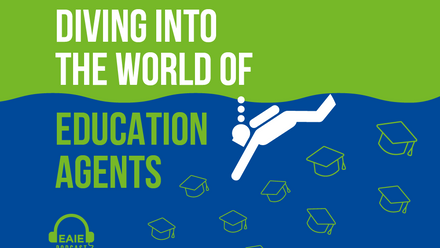International education agents: the good, the bad and the ugly

In today’s reality of the COVID-19 pandemic, and in light of financial uncertainties, academic institutions need to be more efficient in how they use their resources – especially when it comes to recruiting international students. Participating in international fairs, going on recruitment trips and organising mission trips to visit partners abroad can be highly expensive, or not even authorised if there are currently travel bans set by either your institution or government in light of the coronavirus.
So how can institutions maximise their resources while increasing international student enrolment? One promising answer is international student agents. Working with these student recruiters can do institutions a lot of good – but also requires being on the lookout for the bad and the ugly.
The ugly: identifying the right agent
Often when we think of international recruitment agents, other colleges’ and universities’ negative experiences come to mind. Sometimes it’s agents not delivering on their contractual obligations, recommending unqualified students for admission, or in some cases, even defrauding international students and their families.
Working with agencies that are well established and have been running for a number of years is a way to mitigate risks when recruiting international students
So how can you find the right agent for your institution? Before entering into partnership with an educational agent, be sure to do your due diligence. Working with agencies that are well established and have been running for a number of years is a way to mitigate risks when recruiting international students.
Whether you are working with an experienced or a new recruiting agent, you should contact other colleges and universities that have worked with that agent. By doing so, you will not only get direct feedback regarding a specific agent, but it will allow you to learn from the experiences of these institutions so that you can have an efficient and fruitful collaboration with the agent.
The bad: finding common ground
Sometimes higher education institutions collaborate with agents and yet do not see results. This could be the result of a lack of training and administrative support infrastructure that colleges and universities provide to the educational agent.
It is essential to provide continuous training and updates to your educational agents. As a college or university, you need to find your niche and effectively excel at communicating your brand. For an agent to be able to eloquently articulate the strengths of your institution, they first need to know what makes you unique. Knowing your brand (history and culture), as well as your areas of strength (research clusters, academic programmes, inspiring faculty), will allow agents to effectively promote your institution.
Doing an environmental scan of which programmes have the highest and lowest student enrolment will help you and your agent identify which programmes to promote, where and when
Understanding your institution’s needs and your recruiting market is key in having a positive collaboration with educational agents. Doing an environmental scan of which programmes have the highest and lowest student enrolment will help you and your agent identify which programmes to promote, where and when. Understanding the factors driving international students to seek an international education, as well as local economy and culture, will help in effectively promoting the programme in a specific market. For example, depending on their country or region of origin, students may be more interested in the academic experience your institution has to offer, others in university and student life, and still others may be seeking pathways to immigration. Understanding these external factors will help you in identifying the most appropriate academic programmes for each market and even in selecting your future agent.
Another item that higher education institutions need to consider is their remuneration model for educational agents. Most colleges and universities either pay a flat fee per student or a percentage of tuition paid by the international student. Some argue that agents focus mainly on promoting the institutions that provide them with the highest remuneration, resulting in peak increases in international student fees. Finding the right model for your institution is essential to effectively achieve your objectives, whatever they may be, and to ensure alignment with your mission and values.
The good: regulatory bodies and results
Over the past years higher education institutions, along with agencies and government bodies, have implemented new measures to monitor the work of education agents more efficiently, including with regard to immigration issues.
For example, in Canada in order to be able to provide guidance regarding student immigration issues, you must pass an examination to become a Regulated International Student Immigration Adviser. In order to provide this training to a broader community, the Canadian Bureau for International Education (CBIE) launched an online education programme on ‘International Students and Immigration Education’, upon successful completion of which, participants are eligible to write the entry-to-practice exam.
Educational agencies have long been supporting students in seeking overseas education. While some higher education institutions have had negative experiences, other colleges and universities around the world have found benefits from collaborating with them. In the aftermath of the COVID-19 global pandemic, perhaps we can break the stigma and imagine more institutions recruiting the majority of international students through education agents to maximise financial efficiencies and recruitment enrolment targets.






